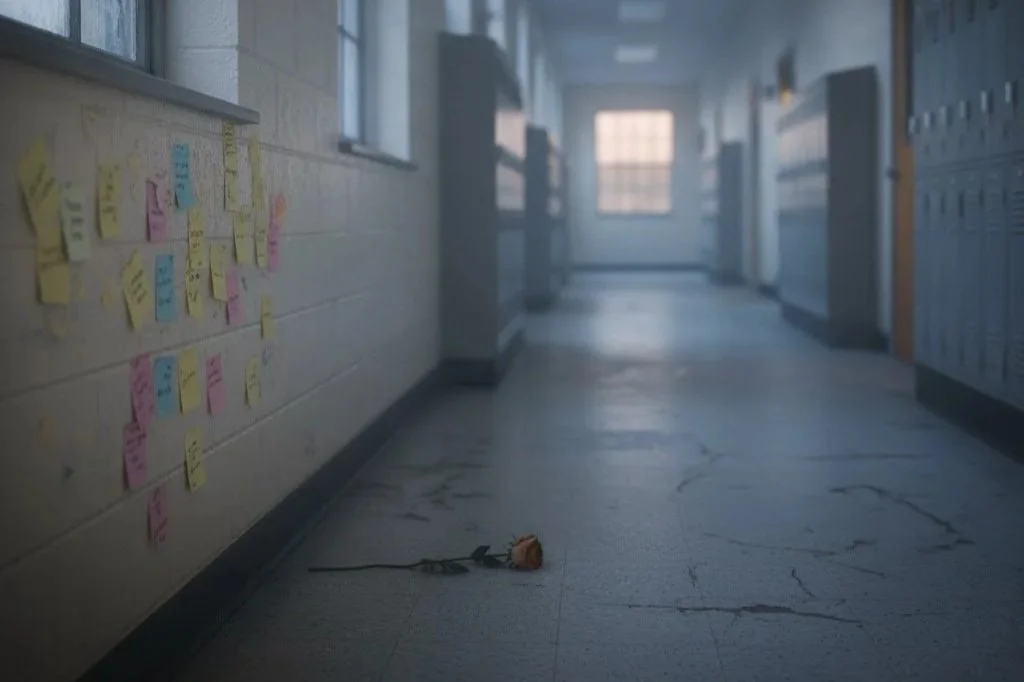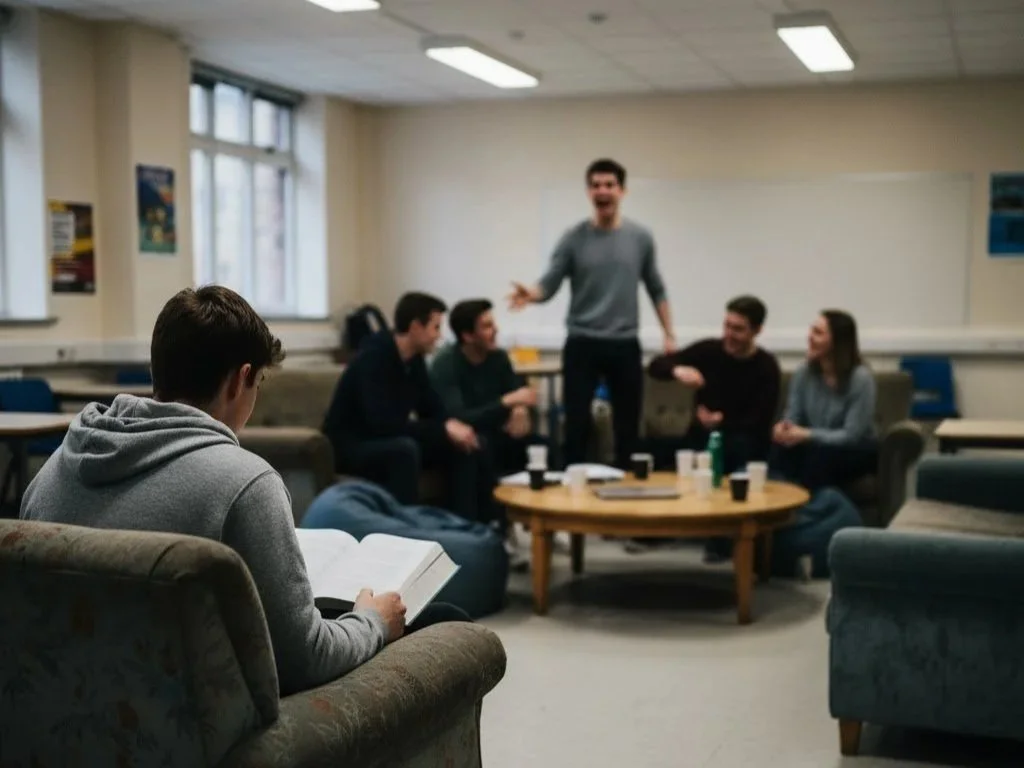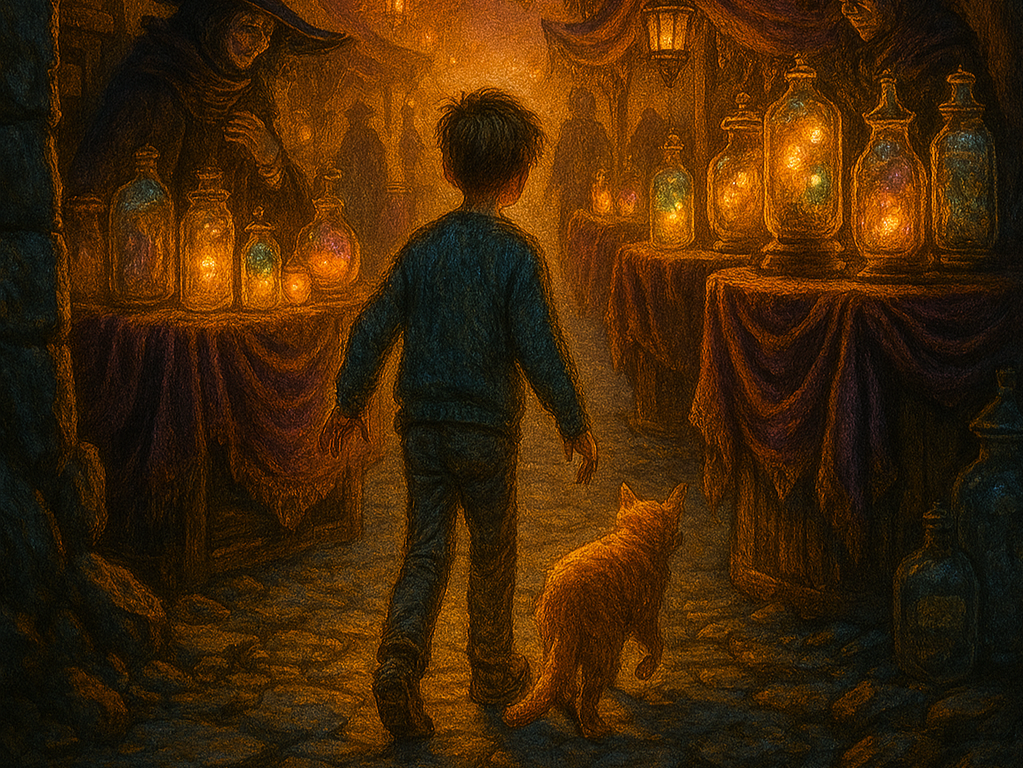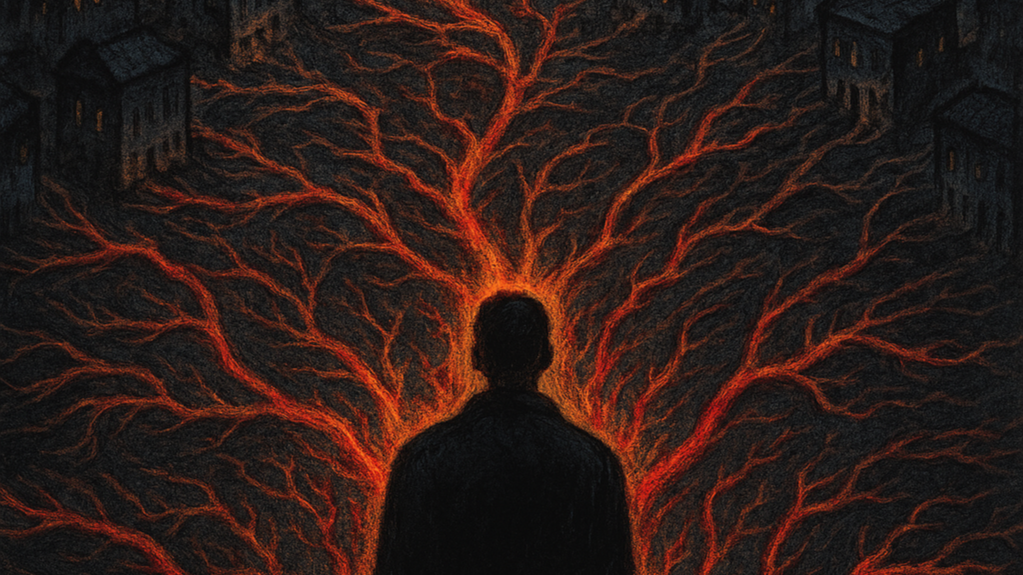The Bench On Bramble Crescent
Chapter One: The Bench Remembers
I am a bench.
Oak, specifically. Treated against rot, bolted to concrete, positioned at the junction where Bramble Crescent curves into the main road. I've been here for forty-three years, which is longer than most marriages and slightly shorter than the Queen's reign when I was installed.
I do not complain. Benches don't.
But I observe. And over four decades, I've observed rather a lot.
The Crescent is one of those streets that estate agents call "characterful," which means the houses are slightly wonky, the pavements uneven, and the residents have lived here long enough to remember when the corner shop sold individual cigarettes and penny sweets. It's the sort of place where everyone knows your business before you do, and privacy is considered a temporary arrangement between gossip cycles.
I sit at the heart of it all.
My wood has weathered to a dignified grey. My brass plaque—"In memory of Arthur Pettigrew, 1935-1982. He liked sitting here."—has developed a pleasing patina. My bolts are solid. My position is permanent.
I am, in the language of estate agents, a community asset.
In the language of the residents, I am that bench by the bakery.
The bakery in question is Bramble Buns, run by a woman called Sadie Okamoto who arrived on the Crescent fifteen years ago with a business loan, a family recipe for custard tarts, and the unshakeable belief that carbohydrates solve most problems. She's not wrong. Her sausage rolls have ended feuds. Her iced buns have comforted the bereaved. Her sourdough is pretentious but excellent.
Sadie opens at six every morning, and by half past, the smell of fresh bread drifts across the Crescent like an olfactory alarm clock. People follow their noses to her door, emerge with paper bags, and often end up sitting on me whilst they eat.
I've held poets and plumbers, pensioners and teenagers, people in love and people recently out of it. I've supported the weight of grief, boredom, rage, and the occasional romantic proposal (three successful, one rejected, two interrupted by rain).
But mostly, I've held Iris Pettigrew.
Iris is eighty-four years old, a widow, and the sort of woman who wears cardigans in August and considers central heating a moral failing. She has sat on me every morning for forty-three years, rain or shine, with a Thermos of tea and a paperback novel she pretends to read whilst actually cataloguing the Crescent's daily drama.
Iris is my longest-standing companion. She knew Arthur—my plaque's dedicatee and her late husband—and she's the reason I exist at all. After he died, she fundraised, lobbied the council, and bullied the local carpenter into installing me exactly where Arthur used to sit and smoke roll-ups whilst waiting for the bus.
"He liked sitting here," she'd said at the small unveiling ceremony in 1982, her voice steady and her eyes dry. "So now everyone else can too."
And they did.
Over the decades, I've become a fixture. A landmark. A meeting point. The place you sit when you need to think, or when you're avoiding going home, or when you've just bought a sausage roll from Bramble Buns and require a moment to appreciate it properly.
This is the story of the people who sat on me.
And the story of what happened when one of them refused to leave.
Chapter Two: The Boy Who Didn't Go to School
Ayaan Okafor arrived on the Crescent in 2024, aged fifteen, carrying a rucksack, a phone with a cracked screen, and the kind of guarded expression that suggested he'd learned early not to expect much from the world.
He moved into number 14 with his aunt Blessing, who worked night shifts at the hospital and slept through most of the day. The arrangement was temporary—Ayaan's mum was "sorting herself out," which is what adults say when they mean something's gone badly wrong but they're trying to stay optimistic.
Ayaan didn't talk much. He didn't go to school much either, which Iris noticed immediately.
"That boy," she said to me one morning, watching Ayaan drift past with his hood up and his hands in his pockets, "is supposed to be in a classroom."
I made no comment. Benches don't.
But Iris was right. Ayaan was supposed to be at Bramble Park Academy, a comprehensive school two miles away that prided itself on "inclusive excellence" and had a rather high tolerance for truancy as long as you didn't cause trouble.
Ayaan didn't cause trouble. He simply didn't attend.
Instead, he walked. He walked the Crescent, the park, the high street, the canal path. He walked with the focused aimlessness of someone trying to outpace their own thoughts. And eventually, inevitably, he ended up sitting on me.
The first time, he sat for eleven minutes, scrolling through his phone with the mechanical detachment of someone passing time rather than enjoying it. Then he left.
The second time, he stayed for forty minutes and sketched something in a battered notebook.
The third time, Iris was already there.
"You're the boy from number 14," she said without preamble.
Ayaan startled slightly, then nodded.
"Shouldn't you be in school?"
"Shouldn't you mind your own business?"
It was said without malice, just a flat statement of fact. Iris, to her credit, laughed.
"Fair point. But I've been sitting on this bench for forty-three years, so I've rather run out of my own business to mind. Other people's business is all I've got left."
Ayaan considered this, then sat down at the far end of me, as far from Iris as possible without being overtly rude.
They sat in silence for a while. Iris poured herself tea from her Thermos. Ayaan pulled out his sketchbook and drew.
"What are you drawing?" Iris asked eventually.
"The bakery."
"Bramble Buns?"
"Yeah."
"Sadie's place. She makes excellent custard tarts. You should try one."
"I don't have any money."
"Then you should sit here until someone offers you one. People are quite generous on this bench. It's the communal guilt."
Ayaan didn't respond, but he kept drawing. Iris kept drinking her tea. The morning proceeded with the gentle inevitability of all mornings on the Crescent: the postman arrived (a man called Ewan, who walked with a limp and always looked faintly apologetic). Mrs. Henderson from number 9 walked past with her ancient corgi, who growled at nothing. Mo from the corner shop carried out crates of fizzy drinks and stacked them in the window display.
Ayaan drew it all.
"You're good," Iris said eventually, glancing at his sketchbook. "Precise. You've got an eye for detail."
"Thanks."
"You're also supposed to be in school."
"You already said that."
"I'm old. I'm allowed to repeat myself."
Ayaan almost smiled. Almost.
"Why aren't you there?" Iris asked, her tone gentler now.
"It's loud."
"School generally is."
"Too loud. I can't think."
Iris nodded slowly, as if this made perfect sense. "And out here, you can?"
"Yeah."
"Then sit," Iris said. "The bench doesn't mind."
And so he did.
Over the following weeks, Ayaan became a regular. He'd arrive mid-morning, after Blessing had left for work and the truancy officers had given up their halfhearted patrols. He'd sit on me, sometimes alone, sometimes with Iris, and draw.
He drew the Crescent in all its mundane glory: the crooked lamp post outside number 11, the cat that lived in the bakery's window, the way Ewan's postbag sagged under the weight of Amazon deliveries, the intricate metalwork on Mrs. Henderson's gate.
And every visit, he'd stop at Mo's corner shop first.
Mo—short for Mohammed, though everyone just called him Mo—ran the sort of shop that sold everything and specialised in nothing. Newspapers, lottery tickets, off-brand crisps, vegetables of questionable freshness, and a fluctuating supply of whatever had been on offer at the cash-and-carry.
Mo was sixty-three, had lived on the Crescent for forty years, and had perfected the art of the suspicious squint. He watched Ayaan the way shopkeepers watch teenagers: with low expectations and high vigilance.
But Ayaan didn't steal. He bought a can of something fizzy—Coke, Fanta, sometimes Lilt if Mo had it in stock—paid with exact change, and left.
Then he'd sit on me, crack open the can, and draw.
The ritual became part of the Crescent's rhythm. Sadie at Bramble Buns would wave at him through the bakery window. Ewan would nod as he passed with his postbag. Mrs. Henderson would pretend not to notice him, which was her way of noticing everything.
And Iris would sit beside him, drinking her tea, occasionally commenting on his drawings, more often saying nothing at all.
"You're getting better," she said one morning, peering at a sketch of the bakery's front door.
"Thanks."
"Have you thought about art college?"
"I'm fifteen."
"That's not an answer."
Ayaan shrugged, sipping his Fanta. "I don't think about the future much."
"Sensible. The future's overrated." Iris paused, then added, "But you should still go to school occasionally. Education's wasted on the obedient, but it's useful for the resistant."
"Are you calling me resistant?"
"I'm calling you clever enough to know what you're avoiding. That's different."
Ayaan didn't respond, but his pencil paused for just a moment before continuing.
They sat in silence after that, the companionable kind that doesn't require filling. Around them, the Crescent carried on: Sadie's bread smell, Mo's grumbling about the council, Mrs. Henderson's corgi, Ewan's steady limp.
And I held them all, solid and uncomplaining, as I'd done for forty-three years.
Benches don't judge.
But we remember.
Chapter Three: The Postman Always Limps Twice
Ewan Pritchard had been delivering post to Bramble Crescent for twenty-two years. Before that, he'd been a roofer, a lorry driver, and briefly—disastrously—a pub landlord. The limp came from the roofing days: a fall, a badly set bone, and an NHS waiting list that turned temporary into permanent.
He didn't complain. Complaining, in Ewan's experience, changed nothing except how people looked at you.
Instead, he walked. Six days a week, rain or shine, Ewan walked the same route, delivered the same post, and nodded at the same people. It was repetitive, low-paid, and utterly predictable.
He loved it.
There was something quietly heroic, he thought, about being the person who brought the world to people's doorsteps. Bills, yes. Junk mail, certainly. But also birthday cards, letters from grandchildren, parcels containing small joys.
He took pride in it.
Every morning, Ewan's route took him past me. And every morning, he paused—just for a moment—to catch his breath and rest his leg.
If Iris was there, they'd exchange pleasantries. If Ayaan was there, Ewan would nod and Ayaan would nod back, and that was enough.
But on the morning of November 14th, 2024, Ewan sat down properly.
Iris was already in residence, Thermos open, paperback face-down beside her. Ayaan was at the far end, sketching, a half-empty can of Coke balanced on the armrest.
"Morning," Ewan said, lowering himself onto the bench with the cautious stiffness of someone whose body had started betraying him.
"Morning," Iris replied. "You look dreadful."
"Cheers, Iris."
"I'm not being rude. I'm being observant. You're pale."
"Long morning."
"It's half past ten."
"Long morning," Ewan repeated, and left it at that.
They sat in silence. Ayaan kept drawing. A woman walked past with a pram. Mo emerged from his shop to yell at some pigeons pecking at a spilled bag of crisps.
Finally, Ewan spoke.
"Delivered divorce papers this morning."
Iris raised an eyebrow. "To?"
"Julie Brennan. Number 22."
"Ah." Iris poured herself more tea. "I did wonder. She's been looking peaky."
"She cried," Ewan said quietly. "Right there on the doorstep. Just stood there holding the envelope and crying."
"What did you do?"
"Nothing. What could I do? I'm the postman. I just bring the bad news. I don't fix it."
Iris considered this. "You stayed, though, didn't you?"
"For a bit. Made sure she went back inside. Felt wrong to just leave her there."
"That's not nothing, Ewan."
Ewan shrugged, uncomfortable with the praise. "It's the job, isn't it? Delivering things. Sometimes it's parcels. Sometimes it's disaster. You just have to turn up either way."
Ayaan glanced up from his sketchbook, just briefly, then returned to his drawing. But something in his posture had shifted—less closed off, more attentive.
"Divorce papers are the worst," Ewan continued. "Worse than bills, worse than jury summons. At least with those, people are expecting something unpleasant. But divorce papers... they're hope dying in an envelope."
"You're very poetic for a postman," Iris observed.
"I've had a lot of time to think about it."
They sat quietly after that. Sadie from Bramble Buns emerged with a tray of iced buns, saw them sitting together, and brought over three on a paper plate.
"On the house," she said. "You all look like you need sugar."
"That's very kind," Iris said.
"It's tactical," Sadie replied with a grin. "Happy customers come back. Sad customers tell everyone my buns cured their depression. Either way, I win."
She left the plate on the bench between them and returned to the bakery, her skirt swishing cheerfully.
Ewan took a bun. Iris took a bun. Ayaan hesitated, then took the third.
They ate in silence, which on the Crescent is the highest form of companionship.
"These are excellent," Ewan said eventually.
"Sadie's a magician," Iris agreed.
Ayaan said nothing, but he drew Sadie's bakery with extra care that morning, adding details he'd previously overlooked: the hand-painted sign, the uneven windowsill, the cat sleeping in a patch of sun.
After Ewan left—postbag over his shoulder, limp slightly more pronounced—Iris turned to Ayaan.
"You're very quiet."
"I'm always quiet."
"Today you're thoughtfully quiet. That's different."
Ayaan shrugged, closing his sketchbook. "He's sad."
"Ewan? Yes. He's been sad for a long time."
"Why?"
"Because he delivers other people's lives and never gets one of his own." Iris screwed the lid back onto her Thermos. "He's kind, competent, and utterly lonely. It's a terrible combination."
"Shouldn't someone do something?"
"Like what?"
Ayaan didn't have an answer.
Iris patted his knee. "Sometimes, love, the best you can do is sit on a bench and share an iced bun. It's not much. But it's not nothing."
She stood, gathered her things, and walked back to her flat at number 7, leaving Ayaan alone with his sketchbook and his Coke.
He sat for another hour, drawing.
And when he finally left, he placed his empty can carefully in the recycling bin outside Mo's shop, rather than leaving it on me.
Small gestures matter.
Benches notice.
Chapter Four: The Gossip Jar
It started as a joke.
Iris had been sitting on me one morning in early December, reading a particularly dull thriller, when Mrs. Henderson walked past with her corgi.
"Morning, Iris."
"Morning, Margaret."
"Cold today."
"Very."
"Did you hear about Julie Brennan?"
Iris had, of course. Everyone had. The divorce papers had been followed by a moving van, a tearful argument on the front lawn, and Julie's departure to her sister's house in Wolverhampton.
"I heard," Iris said carefully.
"Terrible business." Mrs. Henderson lowered her voice conspiratorially. "Apparently, he'd been seeing someone from his gym. One of those personal trainers."
The way she said personal trainers suggested they were one step below arms dealers.
"How dreadful," Iris said, in the tone of someone who'd heard worse.
"Men," Mrs. Henderson said, as if that explained everything. Then she walked on, corgi waddling behind her.
Iris returned to her book, but her mind wandered. The Crescent had always been a repository of gossip—whispered over garden fences, exchanged in Mo's shop, discussed in the queue at Bramble Buns. But it was ephemeral, unrecorded, lost as soon as it was spoken.
What if, Iris thought, there was a way to preserve it?
Not maliciously. Not as a weapon. But as a record. A catalogue of the Crescent's small dramas and minor triumphs.
She mentioned the idea to Ayaan the next morning.
"A gossip jar?" he said, sceptical.
"Exactly. People write down what they've heard, fold it up, put it in the jar. It's like a time capsule, but for nosiness."
"Why?"
"Because gossip is history, Ayaan. It's just history before anyone's decided it's important."
Ayaan considered this, sipping his Fanta. "Where would you put it?"
"Here." Iris patted the bench. "Under the seat. Tucked out of sight but accessible."
"People will just steal it."
"Then they'll steal it. But I don't think they will. People are surprisingly respectful of communal projects, as long as you don't call them communal."
Ayaan thought about this. "I could draw a label."
"Could you?"
"Yeah. Something official-looking. So people think it's meant to be there."
Iris smiled. "That would be perfect."
The jar appeared three days later: a large glass jar with a screw-top lid, tucked into the space beneath my seat where the bolts met the base. Ayaan had drawn a label—beautiful, precise, faintly official—that read:
BRAMBLE CRESCENT COMMUNITY ARCHIVE
Contributions Welcome
Beside it, he'd sketched a tiny image of me, the bench, with a quill pen balanced on the armrest.
Iris added the first entry herself, written on a slip of paper torn from her paperback:
14th December 2024: Julie Brennan's husband left her for a personal trainer. The Crescent is appalled but not surprised.
She folded it carefully and placed it in the jar.
By the end of the week, there were six more entries.
Some were mundane:
Mo's started stocking oat milk. Hell has frozen over.
Some were poignant:
Ewan delivered my daughter's wedding invitation today. I cried. He pretended not to notice.
Some were absurd:
Mrs. Henderson's corgi bit the meter reader. Everyone's taking the corgi's side.
The jar became a fixture, as much a part of me as my brass plaque or my weathered wood. People started sitting on me specifically to read the entries, adding their own observations to the growing archive.
Ayaan contributed sketches—small, detailed drawings of Crescent life that accompanied the written entries. A portrait of Ewan mid-delivery. Mo's shop front. Sadie arranging custard tarts in the bakery window.
The jar filled slowly, steadily, a strange little record of a street that nobody outside the postcode cared about.
But the people who lived there cared.
And so did I.
Benches don't read, of course. But we remember.
And the gossip jar, in its own way, helped me remember better.
Chapter Five: The Morning Iris Didn't Move
It was a Tuesday in December when Iris stopped moving.
She'd arrived at her usual time—ten o'clock, precisely—with her Thermos and her paperback. She'd sat in her usual spot, poured her tea, opened her book.
And then, quietly and without fuss, her heart stopped.
I didn't know immediately, of course. Benches don't sense mortality. But I knew something was wrong when Ayaan arrived twenty minutes later, can of Lilt in hand, and stopped dead.
"Iris?"
No response.
He sat down beside her, carefully, and touched her hand.
It was cold.
"Iris," he said again, quieter this time.
Still nothing.
Ayaan didn't panic. He didn't shout. He simply sat there, holding her hand, and wept with the quiet efficiency of someone who understood that grief required no audience.
Mo arrived running, his apron still on, summoned by some sixth sense that shopkeepers develop after decades of minding other people's business. He stopped when he saw her, his entire body going very still. Then he sat on Ayaan's other side, opened the gossip jar, and began reading the entries aloud—softly, like a litany.
Ayaan pulled out his sketchbook and began to draw.
He drew Iris's hands, precise and capable even in death. He drew the Thermos, the unfinished paperback, my brass plaque. He drew Mo's face, mapped with grief. And finally, he drew me, holding them all.
When the ambulance arrived, the paramedics were gentle and professional. They confirmed what everyone already knew, offered condolences, and asked if anyone needed support.
Mo shook his head. Ayaan kept drawing.
"She was sitting here," Mo said to no one in particular. "She was sitting exactly where she wanted to be."
"Yes," Ewan said, arriving breathless and late and devastated, postbag still over his shoulder. "She was."
They held a small service the following week. The vicar read "Do Not Go Gentle" because Iris had specifically requested it in a note found in her handbag. Mo delivered a eulogy that was funny and devastating in equal measure. Mrs. Henderson sang "Abide With Me" without being asked.
And Ayaan stood at the front, holding a framed sketch of Iris sitting on me, and said only, "She taught me that observing is the same as caring. I'll keep observing."
After the service, they returned to me. Someone had left flowers—mostly chrysanthemums, which Iris would have considered seasonally appropriate. The gossip jar sat in its usual place, slightly fuller than before.
Ayaan opened it carefully and pulled out the top slip of paper. It was in Iris's handwriting, dated the morning she died:
Final entry: Keep sitting. The bench requires witnesses.
Ayaan folded the note, returned it to the jar, and sat down. Mo sat beside him. Ewan joined them a moment later, postbag finally set aside.
They didn't speak. They didn't need to.
I held them all, solid and uncomplaining, anchored to the memory of everyone who'd ever sat there.
If benches could weep, I think I would have. But I'm oak. I don't weep. I endure.
And I remember.
Chapter Six: The Things That Stay
Ewan delivered Iris's final letter three weeks later.
He'd found it at the sorting office, mixed in with the Christmas post, addressed in her unmistakable hand: To Ayaan, The Bench, Bramble Crescent.
"She must have posted it the day before she died," Ewan said, handing it over with the gentleness of someone passing along something sacred.
Ayaan opened it with Mo sitting beside him for moral support. Inside was a single sheet of paper and a small brass key.
Dear Ayaan, it read. If you're reading this, I've presumably achieved the dignified exit I've been planning. Well done, me.
The key is to my flat. In the bottom drawer of my desk, you'll find forty-three years of postcards to Arthur. They're yours now. Not because you need them, but because I think you'll understand what to do with them. They're a catalogue, you see. A record of careful observation. Your sketches are the same thing.
Don't stop drawing. Don't stop noticing. The world depends on people who pay attention to the details.
And please, for heaven's sake, go back to school occasionally. Education is wasted on the obedient, but it's useful for the resistant.
Keep sitting, Ayaan. The bench needs you.
With deep affection and moderate exasperation,
Iris Pettigrew
Ayaan read it three times, then folded it carefully and placed it in his sketchbook. He looked at Mo, then at Ewan, then at me.
"I'll keep sitting," he said.
"We all will," Mo replied.
And they did.
Winter became spring. Spring became summer. The Crescent carried on with its small dramas and minor triumphs. Mrs. Henderson's corgi died, then was replaced by a younger, equally suspicious cat. Mo's shop got new signage (slightly less crooked than before). Ewan finally retired, but continued delivering letters anyway because, as he put it, "What else would I do with my mornings?"
Sadie at Bramble Buns started a community bread scheme—discounted loaves for pensioners, free pastries for the local school. She'd bring extras to me sometimes, leaving them on a paper plate for whoever needed them. Ayaan always took one, Mo usually took two, and Ewan would take one "for later" and eat it immediately.
And Ayaan kept sitting on me, sketchbook open, can of something fizzy at his side, drawing the things that stayed.
He went back to school eventually—not because he wanted to, but because Iris's letter had made a compelling argument about the usefulness of education for the resistant. He still skipped certain days when the noise became too much. But he always came back to me.
The gossip jar filled, then was replaced by a second jar, then a third. Ayaan started dating the entries, adding small sketches to accompany the written observations. The jars became a strange sort of community archive—part diary, part time capsule, part confession booth.
People started sitting on me specifically to contribute to the jars. They'd arrive with folded slips of paper, small secrets and observations they wanted preserved. Some were funny. Some were sad. All of them mattered.
The council tried to remove me once, in the spring of 2026. Something about "redevelopment" and "modernisation" and "improved pedestrian flow." There was a public meeting. Seventy-three people turned up, many of them carrying Ayaan's sketches of me like evidence in a trial.
Mrs. Henderson gave a speech about historical significance. Mo pointed out that I'd become a de facto community centre. Ewan read from Iris's final letter, which he'd been carrying in his pocket since December. Sadie brought trays of custard tarts and sausage rolls, declaring that "any council that demolishes a bench can bloody well demolish Bramble Buns too."
The council withdrew the proposal.
I remained.
A new plaque appeared beside the old one: "Iris Pettigrew, 1941-2025. Librarian, Observer, Sentinel. She was not beige."
Every morning at ten o'clock, you'll find Ayaan sitting on me, sketchbook open, observing. Mo brings biscuits from his shop—usually just digestives, because inflation's been murder, but sometimes something fancy if the cash-and-carry has a deal on. Ewan pauses mid-delivery to share the day's strangest postal story. Mrs. Henderson occasionally stops by to contribute to the gossip jar, which has evolved into something between an archive and a community conscience.
Sadie from Bramble Buns has become a fixture too, joining them on her break with a cup of tea and a running commentary on the Crescent's bread-buying habits. "You can tell a lot about a person by their loaf choice," she says. "Sourdough people are pretentious but reliable. White sliced people are nostalgic. Seeded batch people are trying to be healthy but can't quite commit."
The jars are nearly full now, stuffed with stories and sketches and small, careful observations about the life of Bramble Crescent. Ayaan has started thinking about what happens when the jars outnumber my capacity to hold them.
But that's a problem for future Ayaan.
Present Ayaan is busy drawing the way morning light catches the frost on my armrest, the way Mo's breath clouds in the December air, the way Ewan's limp has become part of the Crescent's rhythm, the way Sadie's hands move when she talks about her latest baking experiment.
He's drawing the things that stay.
And I—oak, solid, uncomplaining—hold it all.
I am a bench. I cannot move. I cannot speak. I cannot change the world.
But I can witness. I can remember. And I can provide a place for people to sit whilst they do the difficult work of being human.
That, I've learned, is enough.
The bench on Bramble Crescent still sits at the junction where Bramble Crescent curves into the main road. I will sit here long after everyone who knows my story has gone. My wood will weather and warp. My plaques will tarnish. Eventually, I will rot and be replaced.
But the stories will remain. In Ayaan's sketches. In the gossip jars. In the memories of everyone who ever sat on me and felt, for a moment, less alone.
I am oak.
I am a witness.
I am the bench on Bramble Crescent.
And I absolutely refuse to be erased.





























Some people move through the world making noise. Thirteen-year-old Leo has learnt to be still. But when an old illustrated book vanishes from the bookshelf, Leo discovers something extraordinary living in the walls of the Victorian house: the Snibbit, a small magical creature that collects beautiful things and understands that silence can be full of meaning. Through carefully preserved fragments from the past, the Snibbit teaches Leo how to navigate a world that isn't built for quiet people.